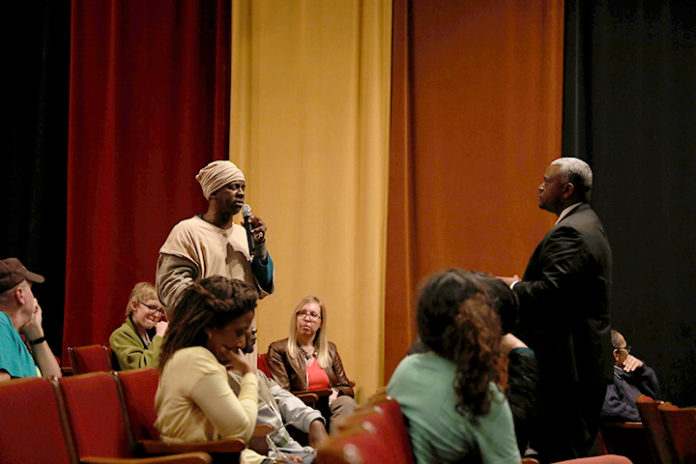
By Rylee Seavers | Staff Writer
Mission Waco hosted its MLK Day Program and Day of Service in honor and remembrance of Dr. Martin Luther King Jr. on Monday.
The program, which was held at Mission Waco’s Jubilee Theater, brought people from the Waco community together to remember King’s legacy through featured speakers from Baylor and Waco, a lunch discussion about racial reconciliation and group service projects throughout Waco.
Mission Waco emphasizes education, dialogue and community service in their MLK Day program, according to Jimmy Dorrell, executive director of Mission Waco.
Mission Waco’s website says that Martin Luther King Jr. Day should be one on which people of different backgrounds can come together and stand against injustice in the United States, especially through nonviolent means.
“Each year we think it’s so critical that we find ways to tell the story,” Dorrell said. “There has probably never been a more important leader for justice in our nation than Martin Luther King Jr.”
Waco attorney Robert Callahan also spoke at the event. His presentation focused on why King mattered and still does today.
“King’s legacy is important, not just from a historical standpoint, not just from the perspective of the past and understanding how that created a foundation for today and for the future, but it’s also important because it’s still relevant,” Callahan said. “We are always only a small step away from repeating those abuses of the past.”
Robert Darden, professor in Baylor’s department of journalism, public relations and new media, has spearheaded the Black Gospel Music Restoration Project, which speaks about the impact that music had on the civil rights movement.
“They couldn’t remember anything Kingsaid in the sermons, they couldn’t remember any of the legislation; they couldn’t remember any newspaper stories, but they could sing to me every song they sang in those dangerous days,” Darden said of those he has interviewed throughout his work.
Many of those same songs are still being sung around the world in places like Syria, China and Lebanon, Darden said. Spirituals are actively being sung today in the Black Lives Matter movement, at funerals and in protests, Darden said.
“Wherever freedom fighters are striving for justice, to me, almost miraculously, these songs suddenly appear,” Darden said.
The program was followed by lunch and discussion groups for all attendees. The discussion centered around racial reconciliation.
“When you are raised in certain groups, you have your own preconceived ideas and you really don’t know about the opposite group,” said LaNelle Tate, local nurse and program attendee. “The more that we talk and get along with each other, you’ll see that we are actually all the same.”
Following the program, 14 groups participated in community service projects at Manna House, Jubilee Food Market and other locations around Waco. Groups helped with gardening, cleaning and construction projects.
“Part of King’s [message] was: we make a difference in the communities we live in,” Dorrell said when talking about why community service is part of the MLK Day Program.
In the last 10 years, non-African-American attendance to King events has declined, despite him being an influential figure for more than just the African-American community, Dorrell said.
“We felt like a part we could add to this [day] was to be able to provide programming that might attract others that wouldn’t come normally to a walk or to a memorial, and come [to the Jubilee Theater] for a program and then get involved in community service,” Dorrell said.





